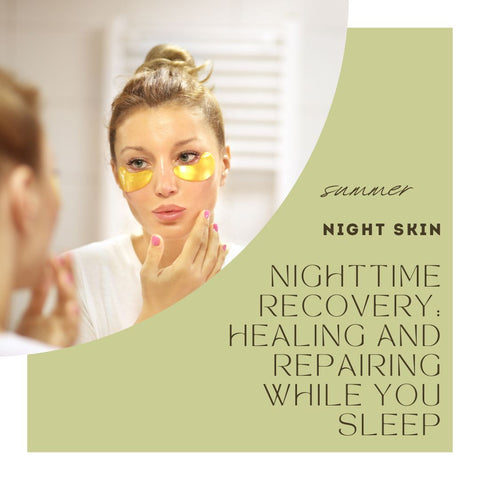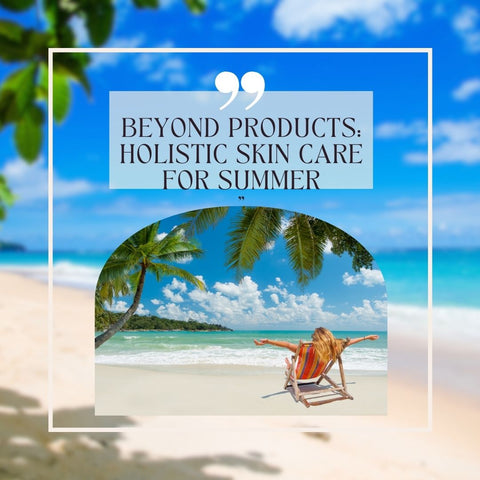Reviving your skin for the summer is vital for keeping that healthy glow. This blog discusses eight essential procedures for achieving great skin health.
Laying the Foundation: Preparing Your Skin for Summer

Preparing your skin for summer is critical to keeping it healthy and radiant during the warmer months. Assessing your skincare routine, deep cleansing, exfoliation, hydration, sun protection, antioxidant protection, moisturising masks, and adopting a healthy lifestyle are all important steps towards getting your skin ready. By doing these basic actions, you can lay the framework for healthy, bright skin that will shine all summer.
Hydrate and Nourish: The Role of Antioxidants and Vitamins
Hydrating and nourishing your skin with antioxidants and vitamins is critical to maintaining its health and vitality. Here's an overview of the roles antioxidants and vitamins play in skincare:
Antioxidants
-
This potent antioxidant brightens the skin, reduces dark spots, and stimulates collagen production, resulting in firmer, more youthful-looking skin. It also protects the skin from UV rays and promotes a uniform skin tone.
-
Vitamin E is a potent antioxidant that moisturises, fortifies the skin barrier, and protects against free radical damage. It also has anti-inflammatory properties, which make it ideal for soothing and calming irritated skin.
-
Green tea contains polyphenols, which are powerful antioxidants that protect the skin from UV rays, reduce inflammation, and prevent collagen breakdown. Green tea extract is commonly used in skincare products due to its anti-aging and soothing properties.
-
Resveratrol, found in grapes, berries, and red wine, is a potent antioxidant that protects the skin from oxidative stress and UV damage. It also has anti-inflammatory properties that can help with the appearance of fine lines and wrinkles.
-
Niacinamide is a versatile ingredient that provides antioxidant protection, stimulates collagen production, regulates oil production, and brightens the skin. It can help to minimise the appearance of enlarged pores, uneven skin tone, and fine lines.
Vitamins
-
Vitamin A derivatives, such as retinol, are known for their anti-aging properties. They promote collagen production, boost cell turnover, and diminish the appearance of wrinkles, fine lines, and age spots.
-
Panthenol is a type of vitamin B5 that moisturises and soothes the skin. It strengthens the skin barrier, improves skin texture, and accelerates wound healing.
-
Vitamin K is well-known for its ability to reduce the appearance of dark circles and puffiness under the eyes. It improves blood circulation and strengthens capillary walls, thereby reducing blood leakage beneath the skin.
-
Vitamin D, while best known for its role in bone health, also has an impact on skin health. It regulates cell growth and repair, promotes wound healing, and aids immune function in the skin.
Sun Protection Strategies: Choosing the Right SPF
Choosing the appropriate SPF (Sun Protection Factor) is critical for successful sun protection. Here's a guide to help you choose the right SPF and develop an effective sun protection strategy, including understanding SPF ratings, considering your skin type and sun sensitivity, using higher SPF for extended sun exposure, broad-spectrum protection, reapplication is essential, water-resistant formulas for water activities, and other sun protection measures. By taking these aspects into account and selecting the appropriate SPF for your skin type and sun exposure needs, you can effectively protect your skin from sun damage and reduce the risk of sunburn, premature ageing, and skin cancer.
Gentle Exfoliation: Keeping Your Skin Smooth and Clear
Gentle exfoliation is essential for maintaining smooth, clear skin since it removes dead skin cells, unclogs pores, and stimulates cell turnover. To incorporate gentle exfoliation into your skincare routine, choose the right exfoliant, use both physical and chemical exfoliation, exfoliate regularly but gently, be gentle during application, pay attention to sensitive areas, moisturise after exfoliation, sun protection is essential, and adjust frequency as necessary. Incorporating moderate exfoliation into your skincare routine can help keep your skin clean, bright, and radiant while reducing the risk of irritation and damage.
Daytime Defense: Protecting Your Skin from the Summer Sun

Protecting your skin from the summer sun is critical for keeping it healthy and avoiding UV damage, premature ageing, and skin cancer. Sunscreen, seeking shade, protective clothes, sunglasses, UV-protected accessories, limiting sun exposure, staying hydrated, regular skin checks, after-sun care, and year-round protection are some of the daily defence measures for keeping your skin safe and healthy. By including these daytime defence tactics in your regimen, you may effectively protect your skin from the summer sun while also keeping it healthy and vital for years to come.
Moisturizing with Benefits: Lightweight Formulas for Day Use
Choosing a lightweight moisturiser for daytime use is essential for keeping your skin hydrated without feeling heavy or greasy, especially in the warmer months. Here are some lightweight moisturisers with added benefits for daytime use:
-
Hydrating Gel Moisturiser: Gel-based moisturisers are lightweight and quickly absorbed into the skin, making them ideal for daytime use, especially for those with oily or combination skin. Look for formulas containing hydrating ingredients such as hyaluronic acid to provide long-lasting moisture without clogging pores.
-
Oil-Free Moisturiser: Oil-free moisturisers hydrate the skin without adding extra oil, making them ideal for oily or acne-prone skin. These formulas frequently include glycerin or dimethicone to hydrate and smooth the skin without leaving a greasy residue.
-
Mattifying Moisturiser: Mattifying moisturisers are designed to reduce shine and excess oil production, making them ideal for daytime use, particularly in humid climates. They frequently contain ingredients such as silica or clay, which absorb oil and leave the skin matte.
-
SPF-Infused Moisturiser: For extra sun protection during the day, choose a moisturiser that contains SPF. Look for formulas with at least SPF 30 and broad-spectrum protection to protect your skin from UVA and UVB rays. These moisturisers hydrate and protect your skin from sun damage.
-
Vitamin C Moisturiser: Vitamin C is a potent antioxidant that brightens the skin, evens out the tone, and protects against environmental damage. Choose a lightweight moisturiser with vitamin C to get these extra benefits while hydrating your skin.
-
Aloe Vera Gel: Aloe vera gel is a great option for daytime use, especially for sensitive or irritated skin, because it is lightweight, soothing, and hydrating. It provides mild hydration without clogging pores and reduces redness and inflammation.
-
Water-Based Moisturiser: Water-based moisturisers are ideal for all skin types, even those with oily or acne-prone skin, because they are lightweight and quickly absorbed into the skin. They moisturise and refresh your skin while providing hydration without leaving a greasy afterglow.
-
Hyaluronic Acid Serum: This hydrating ingredient works wonders for plumping and hydrating skin because it can hold up to 1000 times its weight in water. During the day, use a lightweight hyaluronic acid serum as a moisturiser; layer it under your sunscreen for extra moisture.
Eyes and Lips: Special Care for Sensitive Areas
Taking extra care of the sensitive skin around your lips and eyes calls for using gentle products. The following advice will help you take good care of these delicate areas:
Eyes:
-
Select an eye cream that is light and hydrating, especially designed for the sensitive skin around the eyes. To hydrate, firm, and protect the skin, look for ingredients like antioxidants, peptides, and hyaluronic acid.
-
Use your ring finger to gently dab the eye cream around the orbital bone, avoiding direct contact with the eye. The eye area is prone to wrinkles and sagging, so avoid tugging or pulling on the skin.
-
Wear sunglasses and apply sunscreen around your eyes to protect them from harmful UV rays. Look for mineral-based sunscreens containing zinc oxide or titanium dioxide, which are gentler and less prone to irritation.
-
Adequate sleep is essential for maintaining healthy-looking eyes while also reducing puffiness and dark circles. Aim for 7-9 hours of quality sleep per night to help your skin repair and rejuvenate.
-
To reduce puffiness and soothe tired eyes, try cooling eye masks or creams containing cucumber extract, aloe vera, or chamomile. Keep your eye cream in the refrigerator for an extra cooling effect.
Lips:
-
To remove dead skin cells, exfoliate your lips regularly with a gentle lip scrub or a soft toothbrush. This keeps your lips smooth, preventing dryness and flakiness.
-
Drink plenty of water all day to keep your lips hydrated from the inside out. Dehydration can cause dry, chapped lips, so staying hydrated is essential for keeping them soft and supple.
-
Apply nourishing lip balm or moisturiser throughout the day, especially after eating, drinking, or being outside. Look for lip balms containing hydrating ingredients such as shea butter, cocoa butter, and vitamin E.
-
Sunburn can affect your lips in the same way that it does the rest of your skin. To protect your lips from UV damage, apply an SPF-containing lip balm or a sunscreen stick designed specifically for lips.
-
Saliva can strip moisture from your lips, causing dryness and irritation. Avoid excessive lip licking and instead use hydrating lip balms.
By following these guidelines and incorporating gentle and hydrating products into your skincare routine, you can effectively care for the delicate skin around your eyes and lips, keeping them healthy, hydrated, and youthful-looking.
On-the-Go Refreshment: The Benefits of Cooling Facial Mists
Cooling facial mists is an easy and refreshing way to hydrate and revitalise your skin, especially while on the go. Here are some advantages of using cooling facial mists.
-
Instant Hydration: Facial mists hydrate the skin instantly, replenishing moisture and relieving dryness. They contain water-based formulations that absorb quickly into the skin, leaving it feeling refreshed and rejuvenated.
-
Soothes Irritation: Cooling facial mists are ideal for soothing irritated or inflamed skin after sun exposure, shaving, or in hot weather. Anti-inflammatory ingredients such as aloe vera, cucumber extract, and chamomile help to reduce redness and irritation.
-
Refreshes Makeup: Facial mists can be used to refresh and set makeup throughout the day, keeping it from appearing cakey or dull. A quick spritz of facial mist refreshes your makeup and gives your skin a dewy, glowing look.
-
Prevents Trans-Epidermal Water Loss (TEWL): Transepidermal water loss is when fluid evaporates from the skin's surface, causing dryness and dehydration. Facial mists serve to form a barrier on the face that seals in moisture, avoiding TEWL and keeping the skin moisturised for longer.
-
Evens Skin Tone: Some facial mists contain chemicals like vitamin C and niacinamide, which help to brighten and balance out the skin tone over time. Regular use of these face mists can help to reduce the appearance of dark spots, hyperpigmentation, and dullness.
-
Boosts Radiance: Facial mists instantly brighten your skin, leaving it brilliant and glowing. They help to rejuvenate tired-looking skin, giving it a healthy, revitalised appearance.
-
Portable and Convenient: One of the most significant benefits of facial mists is their portability and convenience. They come in travel-friendly packaging that allows you to carry them in your purse or bag and use them whenever your skin needs a quick pick-me-up.
-
Multi-Purpose Use: Facial mists can be used for more than just hydration. Some formulae include skincare compounds such as antioxidants, vitamins, and botanical extracts, which provide further advantages like anti-aging, antioxidant protection, and skin conditioning.
Nighttime Recovery: Healing and Repairing While You Sleep

Nighttime is an important time for your skin to repair and regenerate, so create a nighttime skincare routine that focuses on healing and nourishing your skin while you sleep. Here are some important steps for nighttime recovery.
-
Start your nighttime routine by thoroughly cleansing your skin to remove makeup, sunscreen, dirt, and impurities accumulated throughout the day. Consider using a double cleansing method, starting with an oil-based cleanser to dissolve makeup and followed by a water-based cleanser to cleanse the skin.
-
If you exfoliate your skin, do it at night to remove dead skin cells and promote cell turnover. However, limit exfoliation to 2-3 times a week to avoid over-exfoliating, which can lead to irritation and sensitivity. Choose a gentle exfoliant suited to your skin type, such as a chemical exfoliant with AHAs or BHAs.
-
After cleansing, apply a hydrating toner to rebalance the skin's pH levels and prepare it to better absorb subsequent skincare products. Look for toners with hydrating ingredients like hyaluronic acid, glycerin, or rose water to plump and hydrate the skin.
-
Apply targeted serums or treatments to address specific skin concerns, such as fine lines, wrinkles, hyperpigmentation, or acne. Choose products with active ingredients like retinol, vitamin C, niacinamide, or peptides to promote collagen production, brighten the skin, and improve overall skin texture.
-
Hydrate and nourish your skin with a rich, emollient moisturizer that locks in moisture and repairs the skin's barrier function overnight. Look for ingredients like ceramides, squalane, shea butter, or plant oils to replenish lost moisture and soothe the skin.
-
Apply a hydrating eye cream to the delicate skin around the eyes to target fine lines, dark circles, and puffiness. Choose an eye cream with ingredients like peptides, hyaluronic acid, or vitamin K to address specific concerns and promote a more youthful appearance.
-
Don't forget to care for your lips by applying a nourishing lip balm or treatment before bed. Look for ingredients like beeswax, shea butter, or lanolin to hydrate and protect your lips from dryness and chapping overnight.
-
To prevent bacteria, dirt, and oil from transferring to your skin while you sleep, it's essential to sleep on clean pillowcases. Consider changing your pillowcases regularly, at least once a week, to maintain a clean sleeping environment.
Repairing Sun Damage: Overnight Treatments
Overnight sun damage repair requires targeted treatments that promote cell turnover, reduce inflammation, and replenish moisture. While it is important to remember that significant sun damage repair requires time and consistency, incorporating overnight treatments can help speed up the process. Here are some viable alternatives:
-
Retinoids are vitamin A derivatives that have been shown to stimulate collagen production, promote cell turnover, and fade sun damage-induced dark spots. Apply a pea-sized amount of retinoid-based product to clean, dry skin before bed, beginning with a low concentration to reduce irritation and gradually increasing frequency and strength as tolerated.
-
AHAs such as glycolic acid and lactic acid exfoliate the skin, reduce sunspots, and improve overall skin texture and tone. Apply an AHA-based serum or cream to clean skin before going to bed, allowing it to absorb and work overnight. Begin with a low concentration and gradually increase the frequency as your skin adjusts.
-
Vitamin C is a powerful antioxidant that brightens the skin, reduces hyperpigmentation, and protects against future sun damage. Apply a vitamin C serum to clean, dry skin before bed and let it absorb completely overnight. For the best results, use stable forms of vitamin C such as ascorbic acid or tetrahexyldecyl ascorbate.
-
Niacinamide has anti-inflammatory properties that reduce redness, soothe irritation, and strengthen the skin's barrier function. Apply a niacinamide serum or cream to clean the skin before going to bed to combat sun damage and improve overall skin health.
-
Hydrating overnight masks or sleeping masks moisturise and nourish the skin while you sleep. Look for masks that contain hydrating ingredients such as hyaluronic acid, ceramides, and plant oils to help replenish moisture and repair the skin barrier. Apply a thick layer of the mask to clean skin before going to bed, then leave it on overnight for maximum hydration and repair.
-
Peptides are amino acid chains that stimulate collagen production, improve skin elasticity, and diminish the appearance of fine lines and wrinkles caused by sun exposure. Apply a peptide-based cream to clean skin before going to bed to promote overnight repair and regeneration.
-
To neutralise free radicals, protect against oxidative stress, and repair sun-damaged skin, use a night cream containing antioxidants such as vitamin E, green tea extract, and resveratrol. Before going to bed, apply the night cream to clean skin, paying special attention to sun-damaged areas.
-
Hyaluronic acid is a humectant, which attracts and retains moisture in the skin, plumping and hydrating dry, sun-damaged skin. Before going to bed, apply a hyaluronic acid serum to clean, damp skin and let it soak in and hydrate the skin overnight.
Soothing and Calming: Reducing Inflammation and Redness
To reduce inflammation and redness in the skin, use gentle and soothing skincare ingredients that help to soothe irritation and promote healing. Here are some effective methods for soothing inflamed or red skin.
-
Aloe Vera: Aloe vera is a natural anti-inflammatory and soothing ingredient that helps reduce redness, irritation, and inflammation. Apply pure aloe vera gel or products containing aloe vera to affected areas to soothe and calm the skin.
-
Cucumber Extract: Cucumber extract has cooling and hydrating properties that help reduce redness and inflammation while providing instant relief to irritated skin. Look for skincare products containing cucumber extract or apply freshly sliced cucumber directly to the skin as a natural remedy.
-
Oatmeal: Oatmeal has anti-inflammatory properties that help calm and soothe irritated skin. Add colloidal oatmeal to your bath or use skincare products containing oatmeal to help reduce redness and inflammation.
-
Chamomile: Chamomile is known for its anti-inflammatory and calming properties, making it an excellent ingredient for reducing redness and irritation in the skin. Use skincare products containing chamomile extract or brew chamomile tea and apply it to the skin as a soothing toner.
-
Hyaluronic Acid: Hyaluronic acid is a hydrating ingredient that helps plump and moisturize the skin while reducing inflammation and redness. Look for hyaluronic acid serums or moisturizers to hydrate and soothe irritated skin.
-
Green Tea Extract: Green tea extract is rich in antioxidants and anti-inflammatory properties that help reduce redness, inflammation, and irritation in the skin. Use skincare products containing green tea extract or apply brewed green tea topically to the skin as a calming toner.
-
Licorice Extract: Licorice extract contains compounds that help reduce redness and inflammation in the skin while brightening and evening out the skin tone. Look for skincare products containing licorice extract to help calm and soothe irritated skin.
-
Cold Compress: Applying a cold compress to the skin can help constrict blood vessels, reduce redness, and soothe inflammation. Wrap ice cubes in a clean cloth or use a cold gel pack and apply it to the affected areas for a few minutes to provide instant relief.
-
Avoid Harsh Ingredients: Avoid skincare products containing harsh ingredients like alcohol, fragrances, and artificial colors, as they can further irritate and inflame the skin. Opt for gentle, fragrance-free products formulated for sensitive skin to help calm and soothe redness and irritation.
-
Stay Hydrated: Drink plenty of water to stay hydrated, as dehydration can exacerbate redness and inflammation in the skin. Aim to drink at least eight glasses of water a day to keep your skin hydrated and healthy from the inside out.
Strengthening the Skin Barrier: Products for Resilient Skin
Strengthening the skin barrier is critical for maintaining healthy, resilient skin that is better able to withstand environmental stress and retain moisture. The following are some key ingredients and products that can help strengthen the skin barrier:
-
Ceramides: Lipids called ceramides to aid in the formation of the skin's barrier and stop moisture loss. Look for ceramide-containing skincare products to replenish and strengthen the skin barrier, thereby restoring and maintaining optimal hydration levels.
-
Fatty Acids: Linoleic and linolenic acids are essential for maintaining a healthy skin barrier. Look for fatty acid-rich oils, such as jojoba oil, rosehip oil, or evening primrose oil, to nourish and strengthen the skin's barrier.
-
Niacinamide (Vitamin B3): Niacinamide is a versatile ingredient that promotes ceramide and fatty acid production, thereby improving skin barrier function. Skincare products containing niacinamide can help strengthen the skin barrier, reduce inflammation, and improve overall skin health.
-
Hyaluronic Acid: Hyaluronic acid is a humectant that attracts and holds moisture in the skin, keeping it hydrated and plump. Look for hyaluronic acid serums or moisturisers that will hydrate and strengthen the skin barrier, lowering the risk of moisture loss and dehydration.
-
Peptides: Peptides are chains of amino acids that aid in increasing the production of collagen and enhancing the suppleness of the skin. To improve overall skin health, minimise fine lines and wrinkles, and strengthen the skin barrier, look for skincare products that contain peptides.
-
Occlusive Ingredients: By forming a protective barrier on the skin's surface, occlusive ingredients such as dimethicone, petrolatum, and mineral oil help to keep moisture in and stop it from escaping. Look for moisturisers or balms with occlusive ingredients to help strengthen the skin barrier and protect it from outside aggressors.
-
Antioxidants: Vitamin C, E, and green tea extract all help to protect the skin from environmental damage and strengthen the skin barrier. Look for antioxidant-rich skincare products to help protect your skin from free radicals and increase its resilience.
-
Barrier Repair Creams: Barrier repair creams are specially formulated with ingredients that strengthen and repair the skin's protective barrier. These creams frequently contain ceramides, fatty acids, and cholesterol to replenish and strengthen the skin barrier, thereby restoring and maintaining optimal skin health.
-
Gentle Cleansers: Harsh cleansers can disrupt the skin's barrier and remove natural oils, causing dryness and irritation. Choose gentle, non-foaming cleansers that effectively cleanse the skin while maintaining its barrier function.
-
Sunscreen: UV radiation can weaken the skin barrier, causing premature ageing and damage. Use a broad-spectrum sunscreen with an SPF of 30 or higher every day to protect your skin from UV rays and keep it strong and resilient.
Beyond Products: Holistic Skin Care for Summer

Holistic skincare for summer is more than just utilising products; it is a comprehensive strategy that takes into account lifestyle variables, diet, and overall well-being to maintain healthy and bright skin. Keep hydrated, protect your skin from the sun, eat a good diet, manage stress, get enough sleep, exercise regularly, practise gentle skincare, keep cool and refreshed, listen to your skin, and prioritise self-care. By taking a holistic approach to skincare that includes lifestyle factors, diet, and self-care routines, you can encourage healthy, beautiful skin from the inside out, resulting in a glowing complexion all summer and beyond.
















